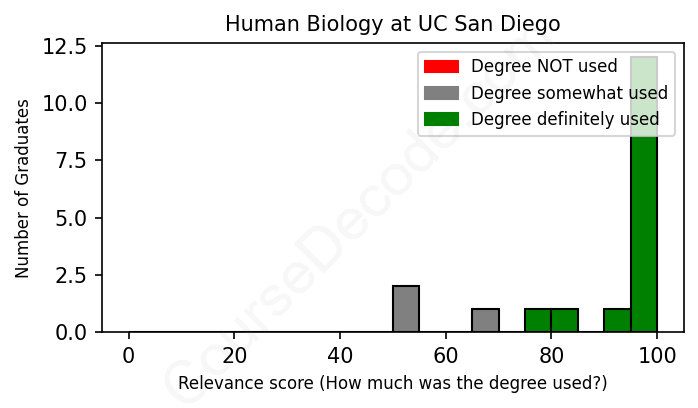
First, some facts. Of the Human Biology graduates from UC San Diego we've analyzed , here's how many have used (or NOT used) their degree in their career:

These are estimates based on AI analysis of 18 LinkedIn profiles (see below).
The verdict? Great! Overall, with an average relevance score of 89%, Human Biology graduates from UC San Diego have a substantially higher likelihood (+22%) of finding work in this field compared to the average graduate across all fields:
And for comparison, here's the chart for all profiles we've looked at across all degrees.
Also, after graduating, 44% of these graduates have pursued further education other than another Bachelor's degree (such as a Masters degree or other), compared to the average across all profiles of 35%. This suggests you may need more than just a Bachelors degree to be competitive as a Human Biology graduate.
See the details:
|
Relevance score: 100% We think this person has gone into a career highly relevant to their degree. We think this person has gone into a career highly relevant to their degree.
DEGREE INFOGraduated in 2022 from UC San Diego with a Bachelor of Science - BS in Human Biology. No other secondary education since. JOB HISTORY SINCE GRADUATIONEmergency and Trauma Room Technician Sharp HealthCare Sep 2022 - Present ABOUTNo information provided. |
The top 10 most common jobs done by the graduates we've analyzed (ranked most common to least) are:
From the analysis of the job profiles of UC San Diego graduates with a degree in Human Biology, it’s clear that a significant number have pursued careers closely related to the field, particularly in healthcare and laboratory settings. Common roles include Medical Assistants, Laboratory Technicians, and Physical Therapy Aides, where the knowledge of human biology is not just useful but essential. These positions often require understanding human anatomy, physiology, and various medical terminologies, indicating a strong relevance to their academic background. Many graduates also take on roles such as Research Assistants and Laboratory Associates, showcasing their ability to apply scientific methodologies learned during their studies to real-world research settings.
However, it's also noticeable that not all graduates land jobs that directly utilize their Human Biology expertise. Some end up in roles like Pharmacy Interns or Dental Insurance Coordinators that only tangentially relate to their degree, involving more administrative tasks rather than a deep application of biological knowledge. Overall, while many graduates find roles that are highly relevant and aligned with their studies in Human Biology, there are also instances of varying degrees of relevance in their career paths. It's a mixed bag, but overall, there’s a solid trend of applying that education in meaningful ways!
Here is a visual representation of the most common words in job titles for Human Biology graduates (this is across all Human Biology graduates we've analyzed, not just those who went to UC San Diego):

Graduates with a degree in Human Biology from UC San Diego seem to generally have positive career trajectories, especially in the healthcare and research fields. Right after graduation, many of them tend to land roles that provide valuable experience in medical and laboratory settings, such as medical scribes, laboratory assistants, and clinical technicians. This early exposure not only helps them build essential skills but also opens doors for more specialized roles as they gain experience. For instance, graduates who started as medical scribes or laboratory technicians often move up to more advanced positions in research or specialized clinical roles within a few years.
Five to ten years down the line, many of these graduates are working in more advanced health-related positions, such as research associates, clinical researchers, and pharmacy interns, or have taken on roles like physical therapy aides or dental assistants. Some have even transitioned into unique opportunities, like founding tutoring groups or taking on significant responsibilities in ongoing research projects. While some individuals explore different avenues, like tutoring or health-related administrative roles, the overarching theme is that most graduates remain connected to the healthcare field, leveraging their Human Biology background to secure fulfilling careers. It's a promising trend that indicates those who study Human Biology often build solid foundational careers that evolve toward their specific interests in health and science!
So, getting a Bachelor’s degree in Human Biology at UC San Diego can be pretty tough, but it really depends on your perspective and study habits. The program dives deep into subjects like biology, chemistry, and physiology, so if you’re not super into science or don’t have a strong background, it can feel like a real mountain to climb. Plus, UCSD has a reputation for being rigorous academically, so you can expect your fair share of challenging coursework and projects. That said, if you’re passionate about the subject and are willing to put in the effort, it can definitely be manageable. Just be ready to hit the books and keep up with the workload!
Most commonly, in the LinkedIn profiles we've looked at, it takes people 4 years to finish a Bachelor degree in Human Biology.
Looking at the job history of these UC San Diego Human Biology grads, it seems like they're gradually working their way up in the healthcare and biotech fields, but honestly, they might not be making a ton of money right off the bat. Many of the positions listed—like medical scribes, aides, and assistants—tend to start with lower salaries, often in the $15-$25 per hour range, especially early on. Some, like the Research Associate positions, can pay better, but it often takes time and experience to get to that level. Overall, they're on the right track toward good careers, but most of them probably aren’t rolling in the dough just yet!
Here is a visual representation of the most common words seen in the "about" section of LinkedIn profiles who have a Bachelor degree in Human Biology (this is across all Human Biology graduates we've analyzed, not just those who went to UC San Diego). This may or may not be useful:

Here are all colleges offering a Bachelor degree in Human Biology (ordered by the average relevance score of their Human Biology graduates, best to worst) where we have analyzed at least 10 of their graduates:
| College | Score | Count |
|---|---|---|
 Indiana University Bloomington Indiana University Bloomington
|
95 | 10 |
 University of California San Diego University of California San Diego
|
89 | 20 |
 UC San Diego UC San Diego
|
89 | 18 |
 University of California, San Diego University of California, San Diego
|
86 | 16 |
 Stanford University Stanford University
|
84 | 10 |
 University of California, Merced University of California, Merced
|
84 | 16 |
 University of Wisconsin-Green Bay University of Wisconsin-Green Bay
|
79 | 10 |
 North Carolina State University North Carolina State University
|
75 | 31 |
 Michigan State University Michigan State University
|
71 | 48 |
 The University of Texas at Austin The University of Texas at Austin
|
69 | 17 |
 University at Albany, SUNY University at Albany, SUNY
|
69 | 15 |
 Hunter College Hunter College
|
60 | 14 |
 University of Southern California University of Southern California
|
58 | 16 |